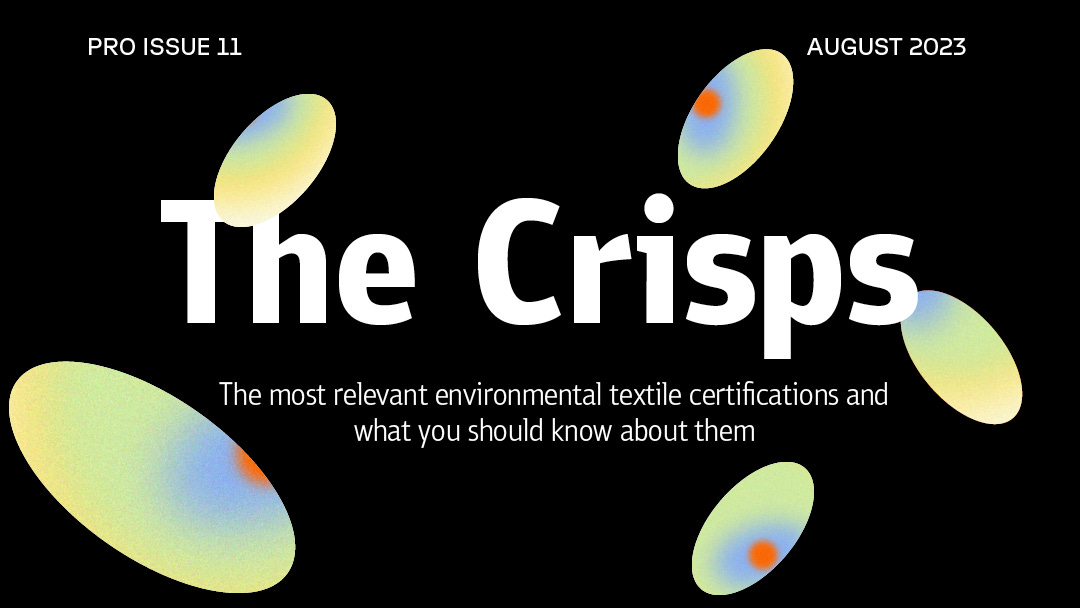The who, what, why and where of environmental textile certifications
A must-read and helpful resource if you want to substantially communicate about environmental textile certifications.
Welcome to another issue of The Crisps – your weekly newsletter on anti-greenwashing and honest fashion communication. In this issue, we’ll look at environmental textile certifications and give you a resource you can always check back on.
Last week we provided you with a lexicon on the world of certification schemes and discussed whether certifications are a straightforward solution to the fashion industry's problems. It's tempting to think so, but the reality is far from it. Certifications like Oeko-Tex, GOTS, and others have faced criticism and challenges, raising doubts about their effectiveness in preventing greenwashing. Even major certifications like GOTS have been embroiled in scandals, exposing the limitations of these systems.
In this issue, we'll dissect certifications like GOTS, Oeko-Tex, and Better Cotton Initiative, examining their intent, drawbacks, and performance. Professionals in sustainability and communication must navigate the complexities and limitations of textile certifications to ensure honest messaging. That’s why this issue is a must-read if you're involved with certifications or communicating them in your fashion company.
Relevant environmental textile certifications you should know
Due to the EU Green Claims Directive proposal certification schemes are becoming increasingly important. The directive proposal not only suggests a framework for creating and acknowledging eco-labels and environmental product certifications but also emphasizes their uniform use across the EU. It highlights that environmental claims can be trustworthy when based on certified certification schemes. Although a complete exploration of this subject requires more than just one newsletter issue, we prepared a list of textile certification programs you should be informed about and applied the who, why, where and what scheme from last week’s issue:
Global Organic Textile Standard (GOTS)
GOTS stands as a comprehensive and widely acknowledged standard for processing textiles crafted from certified organic fibers. It covers a spectrum of social and environmental criteria spanning the entire supply chain.
Who: The Global Organic Textile Standard International Working Group (IWG) consists of four member organizations:
International Association of the Natural Textile Industry (IVN) in Germany
Soil Association (SA) in England
Organic Trade Association (OTA) in the USA
Japan Organic Cotton Association (JOCA) in Japan.
The Global Standard GmbH is the standard owner–now a non-profit limited liability company. Non-profit limited liability companies are private, capital companies under German Business Law.
Why: Mix of content standards for organically certified textile fibers, chemical input, and output management system, improved ecological production, and basic social minimum requirements. GOTS is a voluntary standard that doesn't replace the legal or regulatory requirements of any country.
Where: After harvesting/shearing the whole value chain including every entity needs to be certified. There are loopholes in the case of subcontractors. The agricultural organic certified land or animal husbandry is not certified according to GOTS, generic national organic agriculture standards apply here.
What: The end product can be certified with a GOTS seal, logo or label. Factories and business entities can also be certified in order to be able to produce GOTS-compliant and labeled products.
Oeko-Tex Standard 100
The Oeko-Tex Standard 100 certification signals that textile products have undergone assessments to detect harmful substances, supposedly ensuring their safety for human health. This standard places a spotlight on chemical safety within textiles.
Who: Hohenstein Laboratories GmbH & Co. KG, private standard owner.
Keep reading with a 7-day free trial
Subscribe to The Crisps to keep reading this post and get 7 days of free access to the full post archives.

